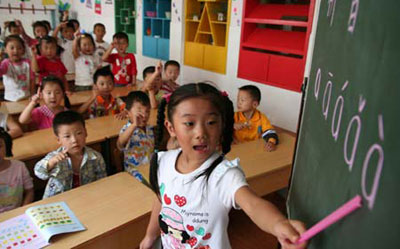Commentary from This Week's Paper
What's "New" about China's "New Left"? - Not Much
EO Online
Ma Licheng - Political commentator and editor of the commentary section of People's Daily.
~ In the 90s, we saw the emergence of China's new left. But what does this moniker refer to, exactly?
~ Unlike the traditional left, the new left does not toss around Stalinist ideas like "planned economy" or "class struggle."
~ China's new left seems young and hip. It accuses modern society of "commodity fetishism," campaigns against globalization, multinational corporations and the general direction of modern capitalism.
~ The movement's main theoretical influence comes from the American New Left of the 1960s and 70s and affiliated prized intellectuals such as Jameson, Lukács and Gramsci
~ According to Jameson, the Cultural Revolution faltered in the moment of truth: at the time of the Shanghai People's Commune, Mao betrayed his own project and turned toward capitalism. This is the line of China's new left.
~ Samir Amin said that capitalism has conquered the world, the US and Europe are its center and developing countries its periphery. Globalization is the latest stage economic colonialism and to the New Left, China's rise is but a form of self-deception.
~ At the core of the disagreement between the new left and its critics is the western concept of modernity.
~ Scholars like Wang Dingding (汪丁丁) echo western intellectuals' critiques of China, saying that China has also become part of world market and enlightenment concepts such as "freedom" and "individual agency" no longer provide perspectives on the country's social problems.
~ Liberal scholars like Zi Zhongyun (资中筠) disagree, arguing that China has not entered a post-modern stage of societal development and is developing differently from western countries, and needs enlightenment values more than ever.
~ New leftists like Wang Shaoguang (王绍光) see democracy as part of the problem, and promotes "continuous revolution." At this point, the New Left looks a lot like the old left.
~ Liberals accuse the New Left of being irrelevant, using theories about developed, late-capitalist countries to critique China. Scholar Ding Xueliang says that China's New Left is not new at all, and unlike its western counterpart that hates both the government and big business, China's New Left clings to the government like a child to its mother.
~Perhaps China needs a new "New Left" that doesn't just critique everything but monitors the government to encourage peace and freedom. In other words, the New Left needs to get with the times.
Original article: [Chinese]
How to Deepen Reform of China's State-owned Enterprises
Observer, page 43
By He Shaoqi, Associate Professor, China University of Political Science and Law and Research Fellow at Changce Think Tank
~In order to further reform of China's state-owned enterprises, we should carry out the following measures:
~Firstly, the State Council should establish a board of review whose task is to divide all state-owned enterprises into three categories according to the kind of business they're engaged in.
~According to these classifications, enterprises engaged in business connected with the public good or social welfare should be controlled and operated by government, those connected to strategic industries that relate either to national security or international competitiveness, should be managed in a flexible way according to the specific conditions of the companies involved and enterprises operating in fully competitive fields should be regulated in the same way that private counterparts are treated.
Original article: [Chinese]
How did the Ticks Rate Local Governments?
Comment, page 16
Wang Lei, EO Commentator
~Over the past year and a half, many people in Henan province's Shangcheng County have died from tick bites. But the epidemic was hidden from the public. The government says this was done in order to "maintain social stability."
~However, when media channels revealed the existence of the epidemic, panic spread among locals and even spread further across the country.
~Though the local government tried to correct its original mistake by holding a news conference and claiming this tick borne disease was "manageable," the public has started to lose confidence in local-level governments.
~Though tick bites have existed in China for more than 1,000 years, what poisons they inject into the human body remain a mystery even today, a fact that casts further doubt on the government's ability to manage the crisis.
~The local government should publish a complete list of the victims of tick bites, explain why the poisons of tick have suddenly intensified and discover solutions to the epidemic as soon as possible.
~Only by doing so will the government be able to regain its credibility.
Original article: [Chinese]

Preschools should not Support the Strong and Bully the Weak
Comment, page 16
By Huang Xiaowei
~It is difficult and expensive for children in China to attend preschool. Recently in Beijing, over a hundred families stood in line for eight days and nights in order to make sure their child was able to attend preschool.
~Why is the starting line so crowded for our children? For two reasons: The numbers of preschool age children are currently peaking in China due to the babies who were born in the year of the golden pig and the Olympics.
~Another reason is that our nation’s preschools are obviously not prepared. For example in Beijing, from 2006-2008, 400 thousand babies were born and currently preschools in Beijing only have a capacity for 226 thousand children. Additionally, the number of preschools in Beijing is decreasing.
~In 2008 China’s preschools had a capacity of 24.75 million, covering only 50% of children aged 3-6.
~Insufficient investment has perpetually been the biggest problem facing China’s education system. Investment in preschool education is the lowest out of all the education levels in China.
~If we do not want to lose our children at the starting line, we propose that the government increases investment and provides help to low-income families in order to bring more equality to the education system.
Original article: [Chinese]
Two Killers of Chinese Economy
Observer, page 46
By Ding Li, EO Senior Editor
~There are two killers harming China’s increasingly powerful economy.
~The first is the intertwinement of business and politics. Chinese officials are always ready to oppress businessmen and businessmen are forced to ingratiate themselves with politics.
~The group of people who have already benefited from China’s current political and economic system is also creating a threat to the Chinese economy. They have a close ties with overseas financial institutions. For example, because centrally-owned enterprises (COEs) are gaining profits by using of their monopoly of the Chinese market, once they get listed on the foreign stock market, foreign investment companies will have easy access to the benefits those COEs have stolen from ordinary Chinese consumers.
Original article: [Chinese]
EO Online
Liu Weixun (刘伟勋) - EO Senior Journalist
~ On Sep 20, The Chinese-language version of the People's Daily published a selection of readers' letters which were all complaints about the arbitary charges that monopoly industries in China were charging for various kinds of services and products.
~ The letters came from people from all walks of life and detailed their own personal experience with the various means by which companies working in monopoly industries were able to demand excessive or unreasonable payment for everything ranging from telecommunication services to cable TV.
~ The letters displayed the difficulties and frustration that ordinary people had in attempting to stand up for their own legal rights as consumers.
~ The charging of arbitary and unreasonable prices for water, electricity, oil, gas, rail transport, telecommunications, banking services et al has helped lead to huge profits for the companies that operate in these monopoly industries and also contributed to the higher wages and other benefits for the executives who run them.
~ In a recent paper authored by the department of the National Development and Reform Commission concerned with monitoring prices, officials acknowledge that although the government attempts to strictly monnitor and control the prices charged by these monopoly industries, there are some case where unreasonable prices are still charged and where regulators are doing a poor job.
~ Although the monopolies are at the core of the problem, it doesn't appear that they'll be disappearing anytime soon, so we should focus instead on stopping these monopolies from abusing their positions. The motivation for this change will not come from within the monoploy companies themselves, but rather a combination of improved regulation and enforcement from government and greater awareness among consumers of their own rights.
~ Indeed, consumers need to better understand their rights and by standing up for them effect pressure on the monopoly enterprises and also assist the regulators in their job of monitoring the companies.
Original article: [Chinese]
Image: Xinhua
The views posted here belong to the commentor, and are not representative of the Economic Observer |
Related Stories
Popular

- ADVERTISING
- Interview with Sir Martin Sorrell - Chief Executiv...
- The EO sits down with the chief executive of the world's largest advertising group
Interactive
Multimedia

- EEO.COM.CN The Economic Observer Online
- Bldg 7A, Xinghua Dongli, Dongcheng District
- Beijing 100013
- Phone: +86 (10) 6420 9024
- Copyright The Economic Observer Online 2001-2011
















